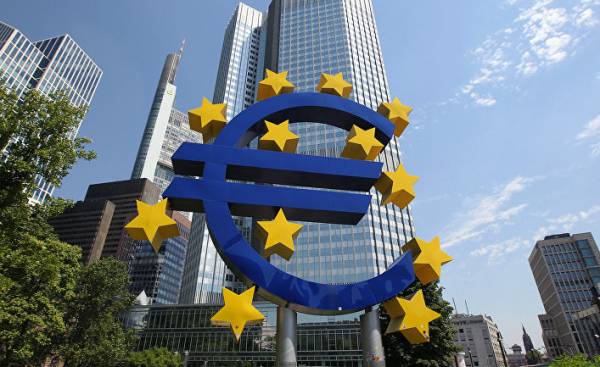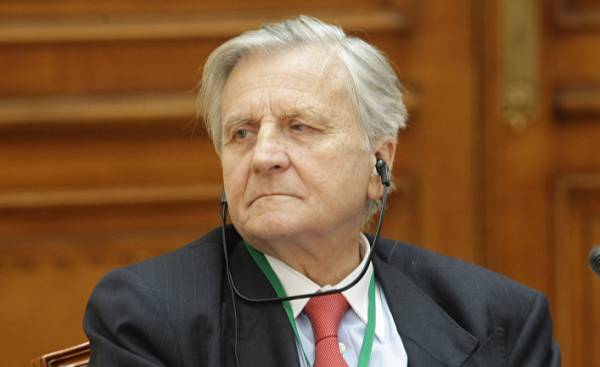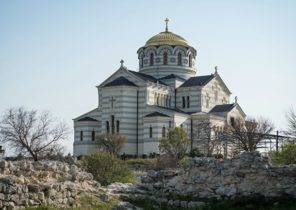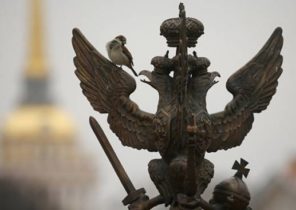
The financial crisis of 2007-2008 plunged the world economy into a strong recession. Anyway, the worst managed to be avoided. The decision of the us authorities to allow Lehman Brothers to fail caused a real chain reaction that nearly caused the collapse of the entire global banking system. As governments and Central banks took this fall? And how from Paris was organized counterattack? The main participants of those events, telling le Monde of the month, when almost crashed the whole of capitalism.
14 Sep 2008: Washington threw Lehman Brothers
September 14, at midnight Paris time, the American administration announced its partners in the G7 (the seven richest Nations of the world), the investment Bank Lehman Brothers the following day will declare bankruptcy. Everyone was dumbfounded, even the concerns in this regard have already been expressed by the heads of European Central banks last September 13 at the nice meeting of EU Finance Ministers.
“A few days before bankruptcy became clear to me that the Minister of Finance and the government of the USA believed that they have neither the political opportunities nor the support of Congress for the rescue of Lehman Brothers on state funds, — says Jean-Claude Trichet (Jean-Claude Trichet), who was then the head of the ECB. — Over the previous few weeks, the Republicans in Congress vehemently criticized the rescue of Freddie Mac and Fannie Mae de”.
He was convinced that the bankruptcy of Lehman Brothers will entail catastrophic consequences. Like his colleague Ben Bernanke (Ben Bernanke), the head of the Federal reserve system, and the head of the Federal reserve Bank of new York Timothy Geithner (Timothy Geithner).
In fact, in the intensive care unit, the fed had three patients: the insurance company AIG and investment banks Merrill Lynch and Lehman Brothers. The weakest were able to stay there? Nobody wanted to believe it. Since the British Finance Minister Alistair darling (Alistair Darling). Barclays was a candidate for the acquisition of Lehman, and darling actively worked all weekend.
The Minister showed himself to be a cold-blooded politician. And imposed on the operation of the veto: “If Lehman goes bankrupt after its purchase by Barclays, we Brits will have to save them both. How can I go to the House of Commons and to declare that we have to pay for the rescue of the American Bank?” Anyway, the news that the us administration threw Lehman to the mercy of fate, a surprise to him.
Shaken by the incident, the Director of Financial administration of France, Xavier Musca Xavier (Xavier Musca) demanded an explanation from his American colleagues David McCormick (David McCormick). He responded calmly: “We checked the positions of international banks. The situation with Lehman is systemic. The markets will boil two to three days, and then everything will calm down”.
16 September: the bailout of AIG
However, the rate has changed. September 16, the new York fed gave AIG a loan of $ 85 billion in exchange for 79.9% of the share capital. Europeans heaved a sigh of relief: bankruptcy of the insurer would have been catastrophic for Société générale, Deutsche Bank and Barclays. Before that, Finance Minister Christine Lagarde (Christine Lagarde) repeatedly asked his American counterpart to take steps to aid AIG. His answer: “I know what to do”…
© flickr.com, FundДиректор International Monetary International monetary Fund Christine Lagarde
In fact, American authorities were unable to cope with unfolding on wall street by storm. At the opening of trading on Monday, shares of American Bank Washington Mutual lost 25%, and quotes Bank of America (it acquired Merrill Lynch) fell by 16%. All day all world channels aired footage of Lehman employees that left the company’s offices in new York and London with the boxes in his hands. “I said to myself: this is the best way to cause panic in the population,” writes darling.
September 25: speech in Toulon
“This evening I take a solemn promise: no matter what happens, the government will ensure the safety and continuity of the French banking and financial system,” said September 25 in Toulon, Nicolas Sarkozy. In his head there were pictures of queues at the doors of the British Bank Northern Rock the year before. He sought at all costs to avoid panic.
The fact that in the summer of 2007, the financial crisis did not go outside the United States, but Lehman’s bankruptcy pushed to the brink and European organizations. Distrust grew. Large enterprises began to withdraw deposits from Société générale and Crédit agricole. Consequences for the real economy had not long to wait. “It was very painful. The contracts were terminated, investment has stopped.” says Mr. Xavier Musca.
The tension grew with each passing day. “Sometimes looking in the evening on the red indicators at the closing of wall street, there were concerns about the fact that the financial system does not stand up in the morning,” recalls a former employee of the office of Christine Lagarde, Emmanuel Moulin (Emmanuel Moulin).
The night flew by quickly. And early in the morning the Minister spoke with the heads of major banks and financial institutions at the conference. One day one of them fell asleep and began to snore. Confused, Christine Lagarde, proposed to continue later.
Nicolas Sarkozy demanded that his every hour was kept up to date with the latest developments. Deputy head of the presidential administration of Francois Perol (François Pérol) day and night has been in touch with bankers and insurers from France, Europe and America. “Some were aware of the risk of a collapse of the system and understand what a crucial role it will play quick responses,” he recalls. The President of the Republic was convinced of the aggravation of the financial crisis since August 2007. In September 2007 he suggested to German Chancellor Angela Merkel to reform the financial system, but did not succeed. Whatever it was, July 1, 2008 it was the turn of France to sit in the chair of the EU.
29 September: the Franco-Belgian night
“What was the worst moment? When the head of a major Bank told me on Tuesday: “I will last until Thursday, but I don’t know what will happen next…” that day, I have a feeling that the end had come,” admits Xavier Musca, without specifying, about whom we are talking. Anyway, this account is one theory. On 29 September, the Franco-Belgian Bank Dexia was left without funds. Its exchange rates have fallen by 28% per session (in parallel with Fortis, although Belgian and Dutch authorities put in him 11 billion euros). In the evening David Pujada (David Pujadas) began a 20-hour news reports about the “Domino effect” of the crisis for European banks.
Night French and Belgian authorities were discussing the rescue plan Dexia. The agreement was approved at 5 am, Nicolas Sarkozy, who pulled out of bed in the middle of the night. All European States took up the case. On the same day in Dublin announced guarantees on deposits in the major Irish banks (much to the dismay of neighbors). The French leader was convinced of the need for joint action and called on a weekend in Paris meeting of the European members of the G8.
Meanwhile, Christine Lagarde referred to the European aid plan in an interview with German newspaper Handelsblatt. However, her colleague, peer Steinbrueck (Peer Steinbrück) were against it. For the year before the election, Berlin has prioritized the budget figures were not going to help the sick French banks. At the same time, the Minister of Finance of Sweden Anders Borg (Anders Borg) definitely haven’t forgotten about the dire consequences of the banking crisis in the country in 1992 and have been to Paris a valuable ally. This original man with a pierced ear and gathered into a ponytail hair once almost came to blows with one of the German partners…
October 4: at the right moment
As expected, held on 4 October meeting of the European Quartet (France, Germany, UK, Italy) was a complete failure. However, at the end of the official dinner at the Elysee Palace Angela Merkel picked up the cell phone and turned pale: the fifth-largest German Bank Hypo Real Estate was in a much more difficult situation than expected. Federal authorities asked for help.
On Sunday, Angela Merkel and peer Steinbrueck appeared on the German television, vowing that the owners of deposits would not lose the “no Euro”. It was a turning point in the crisis. In the evening the British Prime Minister Gordon brown has warned Nicolas Sarkozy’s intention to nationalise a large part of its banking sector.
“I believe in panic only if it is absolutely necessary, but I must admit that came close to this on the morning of 7 October 2008,” admits today, Alistair darling. That day at dawn he flew out for a meeting of EU Finance Ministers in Luxembourg. By the time of his landing the shares of Royal Bank of Scotland (exceeded the size of Lehman) lost in value of 40%.
During the meeting with the European colleagues he went to the phone. “How long will you stay?”, he asked President RBS Tom McKillop (Tom McKillop). “Several hours,” replied the Scottish banker. Then, the operation of ATMs was stopped, the checks ceased to be paid, and the financial operations of the RBS have frozen. “I thought that I was the captain of the “Titanic,” says darling.
Help with liquidity, loan guarantees and emergency recapitalization — the British government has taken extensive measures, set in motion hundreds of billions. Nevertheless, bankers hesitated. Arrogant CEO of RBS Fred Goodwin (Fred Goodwin) made a disgruntled mine: he was against the presence of the state capital. This is not a negotiation, said darling. A principled agreement was reached to one o’clock, and its final version was approved at 5:28 on 8 October.
October 8: “big Bertha”
On the same day the fed, ECB, SNB, Riksbank, Bank of England and the Bank of Canada issued a joint statement on the reduction by 50 points refinancing rates, supported the Bank of Japan. Their goal was to calm the markets, reducing the cost of financing. “In an attempt to restore confidence, we have decided on coordinated action on an unprecedented scale as before and afterwards”, explains Jean-Claude Trichet.
Central banks the first day was watching the spread of panic from one financial platform to another. September 18, three days after the collapse of Lehman Brothers, they came together to announce the extension as swap agreements that provide currency exchange. It was supposed to prevent the drying up of dollar funding market, whose banks needed it on a regular basis.
“I had a feeling that the financial system was crumbling before my eyes, like a pack of cards,” recalls the former head of the ECB. The Central banks decided to inflict even more severe blow, which required serious preparation. To confirm a coordinated reduction of interest rates, they began to carry out the all new an extraordinary meeting via teleconference, at the national and international level. Within a few weeks Trichet has actively expanded contacts with European governments.
October 11: the cross of Lorraine
A big symbolic step was the joint opening of Nicolas Sarkozy and Angela Merkel, the memorial Charles de Gaulle in Colombes-Les-Deux-Eglises, 11 Oct. Behind the scenes, also during the negotiations on the development of a common “Toolbox”, said the Chancellor.
Surprisingly, this time no one tried to cheat with the numbers after the decimal point. “Half of lunch I was talking to economic Advisor to Angela Merkel, Jens Weidmann (Jens Weidmann) on the amount of public assistance. “Year guarantees for French banks will cost us approximately 360 billion euros,” I told him. “Our side has to be 500 billion,” he said,” says Francois Perol.
The next day at the Elysee Palace hosted the European summit last hope. Preparations for this meeting began on Wednesday in Washington, where, as usual, in the autumn gathered representatives of financial circles from all over the world at the autumn conference of the IMF and the world Bank. The Europeans have the impression that they were at the funeral. The Americans realized that the announced measures ($700 billion on the repurchase of debt) is not enough to calm the markets. Christine Lagarde, Jean-Claude Trichet and the head of the Eurogroup Jean-Claude Juncker (Jean-Claude Juncker) withdrew before the end of the traditional dinner and boarded the plane that sent them Nicolas Sarkozy.
October 12 the President introduced the large living room of the Elysee Palace its plan of action the heads of state and government of the Eurogroup. “He talked to them like they are his Ministers” — says the eyewitness. Speech, Nicolas Sarkozy had supported Gordon brown and Jean-Claude Trichet. European leaders decided to create at the disposal of the States an Arsenal of guarantees and capital to stabilize the banks. When the head of the European Commission Jose Manuel Barroso (José Manuel Barroso) said about the need for scrupulous implementation of the Brussels legislation on state aid, they all looked at him with surprise.
 © RIA Novosti, Alexei Nikolsky | go to fotobanka European Central Bank President Jean-Claude Trichet
© RIA Novosti, Alexei Nikolsky | go to fotobanka European Central Bank President Jean-Claude Trichet
Two days later Henry Paulson also adopted the full range of measures. “The reaction of Europeans played a decisive role. The European plan of support and adopted in parallel, decisive steps to allow the United States to overcome the panic that threatened the foundations of the global financial system,” said the former Chairman of BNP Paribas Michel Ibero (Michel Pébereau).
October 13: a synchronous steps
October 13, almost a month after the bankruptcy of Lehman Brothers, France, Germany, Italy, Portugal and Spain jointly announced a plan to support banks in each country. At the request of Angela Merkel, the news was announced simultaneously. The Chancellor even suggested that France and Germany at the same time hold an extraordinary meeting of the Council of Ministers. Covered by the euphoria of European stock exchanges grew by more than 10%.
French speed record of the development of the bill was beaten. At 10 am on Saturday, Francois Perol, Xavier Musca, Deputy head of the Prime Minister Antoine Gosset-Grenville (Antoine Gosset-Grainville) has agreed on the distribution of roles. While the first and second worked on the European summit, the third dealt with the bill. “That weekend we brought in 200 people from the Ministry of Finance. All came,” says Gosse-Grenville.
Sunday held an extraordinary meeting of the State Council. Evening in the financial bill was approved by the dizzying amount of 360 billion of state guarantees. The process was completed by 22:30.
The next few days the French banks lined up at the window with the help of the state. About those events is still under debate. In private large enterprises claim that they need this support to overcome the crisis. “On the verge was only BNP Paribas and BPCE”, say some. At BNP Paribas, of course, deny everything.
However, then the French banks did not suspect that they are waiting for a new wave of confidence. Markets do not know gratitude, and in three years after rescuing the global financial system, Europe is faced with the Eurozone crisis.







